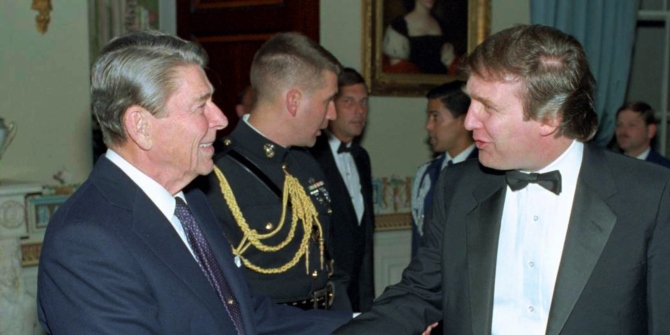 With only a few days left until his inauguration, Donald Trump has largely filled out his foreign policy team. US Centre Director Peter Trubowitz writes that Trump’s choices show that he is making good on his campaign promise to shake up Washington. By choosing “America Firsters”, he writes, Trump seeks a foreign policy strategy that fully exploits US strategic advantage, at least in the short run.
With only a few days left until his inauguration, Donald Trump has largely filled out his foreign policy team. US Centre Director Peter Trubowitz writes that Trump’s choices show that he is making good on his campaign promise to shake up Washington. By choosing “America Firsters”, he writes, Trump seeks a foreign policy strategy that fully exploits US strategic advantage, at least in the short run.
Donald Trump will be sworn in as America’s forty-fifth president on Friday 20 January. The prospect of a Trump presidency has provoked anxiety across the West (see here, here, and here) about what it will mean for America’s international role and commitments. In the United States, much of the discussion has focused on Trump’s choices to fill key foreign policy positions in his administration. This is because in Washington the working assumption is “personnel is policy.” One does not have to fully subscribe to this “inside the beltway” view to recognise that presidents’ personnel choices can tell us some important things about their foreign policy priorities, how they hope to manage foreign policy, and what we might expect at the broadest level of foreign policy, what international relations scholars call “grand strategy.” Looking at the team Trump is putting in place, there are a few things that stand out:
The first and perhaps most obvious is that Trump is making good on his pledge to shake things up in Washington. Few of his key foreign policy picks have any experience working in the organizations they will be heading up. The main exceptions are James Mattis at Defense and Robert Lighthizer as UT Trade Representative. Everyone else, from Rex Tillerson at State, to Michael Flynn at NSC, to Mike Pompeo at CIA, to Wilbur Ross at Commerce, to Peter Navarro at the new National Trade Council fits this description. One can agree or disagree about how much of a liability this will be. I suspect that it will result in some early stumbles out of the gate, though to be fair to Trump’s team, probably fewer than Trump’s Twitter account will generate. From Trump’s perspective, the domestic upsides of disrupting the Washington foreign policy establishment almost certainly outweighs the international downsides. And in a way, it enhances his international credibility. Trump’s willingness to follow through on his campaign pledge to mix things up in Washington shows that it wasn’t just “cheap talk.”
Trump’s personnel choices are also meant to signal changes in tone and focus. The group of foreign policy advisors to watch early on are the “America Firsters.” By American Firsters, I mean individuals who think the US is getting the short end of the stick internationally and that Washington needs to be (1) more strategic economically, not just with potential adversaries like China, but also with its allies and friends and (2) more willing to work with unsavoury characters (e.g., Putin, Assad) to get what it wants in the rough and tumble world of international politics. The real leader of the pack here is likely to be Steve Bannon, Trump’s chief strategist and soon to be former head of Breitbart News. Bannon is no foreign policy expert, but he has strong views on the topic. Moreover, he has Trump’s ear and is thus likely to have outsized influence in this area. How much clout this group (which also includes Flynn, Ross, Navarro, and Lighthizer) has will depend on a several things: whether Mattis is able to form a counter alliance with Tillerson (Trump is betting not), whether House Republicans led by Speaker Paul Ryan will roll over on free trade, and those worried about Putin’s Russia like Senators John McCain and Lindsay Graham give ground (Trump is betting they will), and how popular such mercantilist behaviour proves to be with the American public (Trump’s betting is a lot).
Trump’s foreign policy choices also tell us something about his own view of America and its trajectory. Trump’s campaign was predicted on the idea that America has lost its mojo. “We don’t win anymore,” as he put it over and over again at his rallies. Trump’s pledge to make America great again is based on the assumption that the US is in decline, but importantly, self-inflicted decline. To put it another way, Trump believes the US is suffering from an absence of will, not a shortage of power. The assumption is that US has a lot of international running room or as he might put it, “bargaining room,” and that the reason the US is falling behind is that it is not exploiting its advantages.
How this idea will translate into practical foreign policy terms is anyone’s guess right now. I don’t think Trump himself has a clear view on this. But if I had to bet, I would put my money on China being the primary target. Beijing is the poster child for the case Trump has been making to the American people about why the US no longer wins. In his view, China has been taking America to the cleaners on trade. The question Americans (and alas, their allies in Asia and Europe) should be asking themselves is what is Trump prepared to do to strengthen America’s bargaining leverage vis a vis China and just as importantly, what is he prepared to give up to get concessions from Beijing. Keep your eyes on Moscow, Pyongyang, and Taipei. If Trump does focus his energies on China, he will be looking for pressure points and will need bargaining chips to cut a deal that he can sell back home.

For Trump, America First is not about keeping the world away or pulling back. It is about redefining the terms of US international engagement. In this, there is much that reminds one of Richard Nixon’s approach to foreign policy. Nixon also tried to redefine the terms of engagement: with the Soviet Union through détente, with China through a “tacit alliance,” and with America’s allies through the Nixon “shocks” (going off the gold standard; slapping tariffs on them). And Nixon of course had no problem aligning with unsavoury international characters to reach his strategic objectives. Moreover, like Nixon, Trump’s desire to change the terms of international engagement serves his political self-interest. If Trump can deliver tangible gains on this front, especially in the area of trade concessions, he will strengthen and broaden his coalition of support in the big industrial states he won.
Could Trump realise strategic gains similar to those that Nixon achieved? Possibly, but there are grounds for scepticism. For one thing, America’s main strategic competitor back then (the Soviet Union) was an economic pygmy compared to China today. Second, how much of a foreign policy president Trump sees himself is not clear. Nixon invested the bulk of his time and political capital in foreign policy. Indeed, he privately dismissed domestic policy as “building outhouses in Peoria.” If Trump’s campaign promises and Cabinet picks are anything to go by, he attaches at least as much weight to domestic policy as foreign policy. Finally, as Nixon learned the hard way, programmatic change on the foreign policy side requires a lot of political “buy in” on the domestic side. Nixon never managed to fully get it and he held office at a time when the institutional hurdles that had to be overcome to get it were far lower. Trump has his work cut out.
And what of Trump’s core assumption that America has a lot of geopolitical slack or room for error internationally? At one level, he is right: America does not face a peer international challenger today. However, in world politics unforced strategic errors very often have geopolitical consequences, even for great powers like the United States. Making strategic concessions to Beijing to gain economic advantages may play well in Peoria, but it will only fuel the anxiety America’s allies in Asia are now feeling about the credibility of US commitments to their security. In a region that is ripe for rivalry, it is hard to see how this will work to America’s long-run strategic advantage. Personnel matters in foreign policy, but so does good strategy.
Featured image credit: Gage Skidmore (Flickr, CC-BY-SA-2.0)
Please read our comments policy before commenting
Note: This article gives the views of the author, and not the position of USAPP– American Politics and Policy, nor of the London School of Economics.
Shortened URL for this post: http://bit.ly/2j5kXuA
______________________
About the author
 Peter Trubowitz – LSE US Centre
Peter Trubowitz – LSE US Centre
Peter Trubowitz is Professor and Head of International Relations, and Director of the LSE’s US Centre. His main research interests are in the fields of international security and comparative foreign policy, with special focus on American grand strategy and foreign policy. He also writes and comments frequently on US party politics and elections and how they shape and are shaped by America’s changing place in the world.






